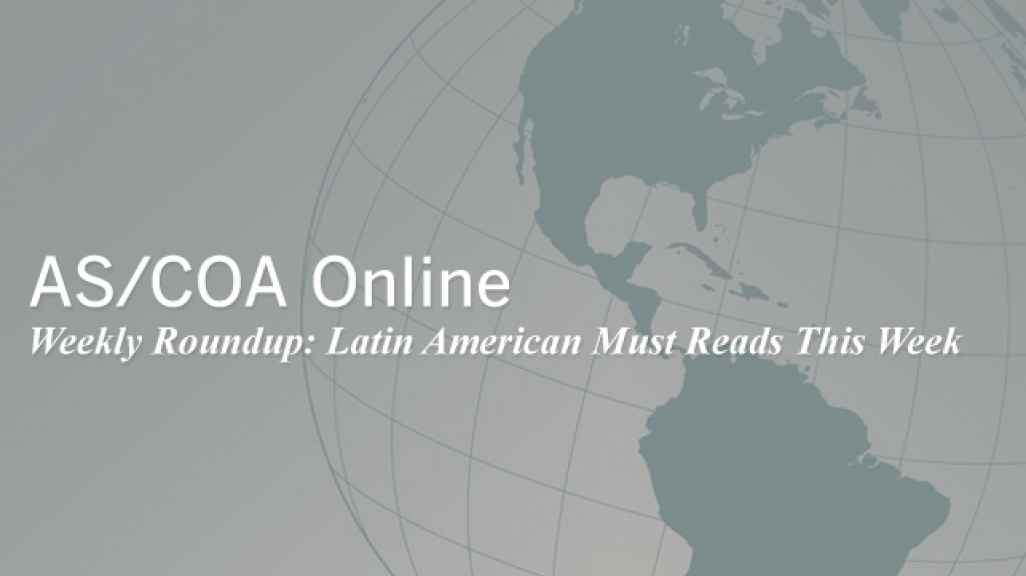Weekly Roundup: Colombia's Peace Process, CentAm Development Plan, LatAm's Indigenous
Weekly Roundup: Colombia's Peace Process, CentAm Development Plan, LatAm's Indigenous
Mexico’s president announces participation in UN peacekeeping operations, Pacific Alliance leaders seek closer ties to Mercosur, and the Venezuelan government launches a crime-reporting mobile app. Read these stories and more.
Colombian Government and FARC Release Preliminary Peace Process Accords
On September 24, the Colombian government and the Revolutionary Armed Forces of Colombia (FARC) jointly released 65 pages of preliminary accords reached in ongoing peace talks. The agreements focus on agrarian reform, political participation of former rebels, and anti-drug trafficking efforts. In New York for the UN General Assembly, President Juan Manuel Santos said the documents aim to counter “all kinds of speculation about what has been agreed upon.” The Associated Press points out that the accords show few surprises, though one agreement includes the proposal to temporarily reserve legislative seats for former guerrillas and other residents from areas of conflict.
Policy Shift: Mexico to Participate in UN Peacekeeping Ops, Says EPN
During his UN General Assembly speech on September 24, Mexican President Enrique Peña Nieto announced that his country will step up participation in UN peacekeeping operations. Such a move marks a departure from past non-interventionist foreign policy; Mexico has not played a role in peacekeeping missions in over two decades, when it sent 120 police officers to El Salvador from 1992 to 1993. Future participation in peacekeeping operations would require the approval of the Mexican Senate.
Find out what other Latin American leaders said at the opening of the UNGA this week.
Good News for Rousseff: History Bodes Well for Latin American Incumbents
This week, The Buenos Aires Herald published an analysis by Chilean political scientist Patricio Navia on this year’s Latin American presidential elections. Navia previews upcoming votes in Bolivia, Brazil, and Uruguay and writes that historically, Latin American incumbents have an edge; since 1990, only one incumbent in the region has lost. Navia notes that while Marina Silva—Brazilian President Dilma Rousseff’s main challenger—has risen in the polls, she faces an “almost unsurmountable challenge” to defeat an incumbent.
For updates, polls, and analysis on Latin American elections, visit AS/COA Online’s election guide.
Central American Governments Propose Development Plan to Curb Migration
On September 23, the governments of El Salvador, Guatemala, and Honduras presented a proposed development plan to the U.S. government in a bid for funding. The "Plan of the Alliance for Prosperity in the Northern Triangle" would fund infrastructure and energy projects worth an estimated $1 billion in an effort to create jobs and stem migration to the United States. Reuters reports that U.S. Secretary of State John Kerry told Central American authorities that the U.S. government would make $50 million available, with a possibility of more funds coming from Congress.
Learn more about the Central American migrant crisis in an Americas Quarterly web exclusive.
Pacific Alliance Leaders Seek Closer Ties with Mercosur
While attending a Bloomberg event on the sidelines of the UN General Assembly this week, the presidents of the four Pacific Alliance member countries—Chile, Colombia, Mexico, and Peru—expressed interest in greater integration with the Southern Common Market (Mercosur), the trade bloc comprising Argentina, Brazil, Paraguay, Uruguay, and Venezuela. Officials from the two groups will meet in November to discuss potential collaboration. “We’re optimistic that at some point we can create more than a customs alliance,” said Peruvian President Ollanta Humala, who also hinted new Pacific Alliance members could be announced in the short-term.
Learn about the Pacific Alliance’s origins and goals in an explainer on the bloc.
Ruling Party Maintains Poll Lead ahead of Uruguay Vote
One month before the country’s general elections, Uruguay’s ruling Broad Front party has a 10-point lead over the National Party, according to CIFRA’s latest voter intention poll released this week. The September survey measured the Broad Front’s support at 43 percent, up two points since August. The opposition National and Colorado parties polled at 33 and 15 percent, respectively. Around 5 percent said they were undecided or planned to cast a blank vote. A runoff will take place on November 30 if no candidate receives an absolute majority.
Read more about Uruguay’s presidential candidates and the top issues for voters.
Report: Latin America’s Indigenous Population on the Rise
A new Economic Commission for Latin America and the Caribbean (ECLAC) report published September 22 shows that Latin America’s indigenous population rose significantly in the first decade of the twenty-first century due to improved health, education, and political participation. In 2010, 45 million Latin Americans self-identified as indigenous, up from 30 million in 2007. ECLAC also published an infographic showing the country-by-country breakdown of the region’s 826 tribes. The report’s release coincided with the World Conference on Indigenous Peoples in New York.
See how Latin American countries rank on inclusion of minority groups, including the indigenous, in AQ’s Social Inclusion Index.
Venezuela Launches Smartphone App for Reporting Crime
This week, Venezuelan officials announced the launch of “Intelligent Patrolling,” a geolocation-based smartphone application which connects users to police. Aimed at speeding up police responses, the app is part of a wider security initiative of the same name implemented in January. The app also sends users security alerts and provides neighborhood-based crime statistics, reports InSight Crime.
Listen to an interview with Pixables Andres Blank on digital entrepreneurship in Venezuela.







